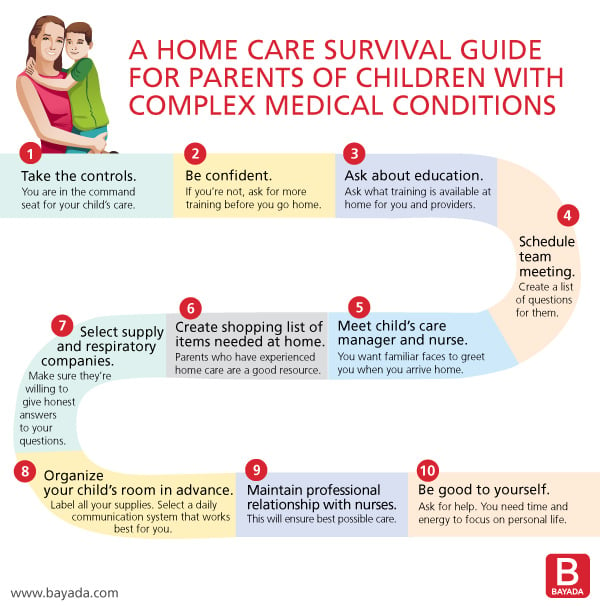That day – the one you hoped for, prayed for, worried would never come - is fast approaching. Your child is almost ready to go home from the hospital and your caregiver training by the hospital staff is complete. This is not something you asked for, but you have accepted the challenge. Still, facing the future and the challenges that lay ahead for you and your child can be daunting. Fear of the unknown is a powerful thing! You know you can’t do it all, not for 24 hours a day. You know you need help, but the thought of having strangers in your home to provide care for your child may not be appealing. A good remedy for decreasing fear and anxiety about the future at home is to anticipate and plan for what you need before you leave the hospital. You want to eliminate as much of the unknown factor as possible. How can this be done?
Here is a list of 10 Essential Requirements for Safe Pediatric Home Care to consider before leaving the hospital that can help you prepare for the big day when you go home:

- You are in the command seat for your child’s care. Take the controls. Don’t be afraid to be assertive. This is your child and you know what is best for your family.
- Make certain you feel confident with all the new skills you have learned in the hospital. If you have doubt, ask for more training and practice before you go home. Confidence alleviates anxiety.
- When selecting a home care agency, ask what specific education and preparation have been provided for their nurses to meet the unique needs of your child. Ask what on-going training is available at home for you and your care providers as the needs of your child change.
- Ask to schedule an interdisciplinary team meeting with the hospital staff and home care agency– the doctors, nurses, social worker, chaplain, and home care agency nurse manager – to make your expectations and needs for home care known. Create a list of questions for them so that you don’t forget to ask something important. Seek honest, realistic answers to your questions, not just the answers you hope to hear.
- Ask the home care agency if you and your child can meet your child’s care manager and primary nurse at the bedside in the hospital before you go home. You want to have as many familiar faces as possible to greet you when you arrive home with your child for the first time.
- Create a shopping list of all of the items you will need at home while you are in the hospital. Add to the list every time you think of something else. You will be too busy to shop when you first go home. You may meet other parents in the hospital who have already experienced home care. They can be a good resource for making your shopping list, as well as a source of support and encouragement.
- Select a supply company and a respiratory company that are willing to give honest answers to your questions. For example, are they available 24-hours a day to provide service?
- Organize your child’s room well in advance of your departure from the hospital. Label all your supplies. Select a daily communication system that works best for you. For example, a white board in your child’s room allows you to add important information daily and can be seen as soon as the nurse walks into the room. Open, honest communication with your home care providers will be invaluable for reducing stress and developing trust.
- Expect to maintain the same professional relationship with your nurses at home that you had with the hospital staff nurses. Home care nurses need to maintain professional boundaries in order to provide the best possible care for your child. Crossing those boundaries can lead to undesirable outcomes, unnecessary stress for you, and disruption of care.
- Plan to be good to yourself when you go home. Don’t be afraid to ask for help. It may be challenging for you to step back and allow others to help. Once you develop trust with your home care providers, you need time and energy to focus on your personal life – essential sleep, household duties, other family members, recreation, work, and all other aspects of your life.
Congratulations on going home! A fantastic journey is about to begin. All parents of children with complex health care needs make a reasonable assumption that the people who support them at home are prepared and qualified to provide safe, proficient care to their child. Don’t settle for less.



Let Us Know What You Thought about this Post.
Put your Comment Below.